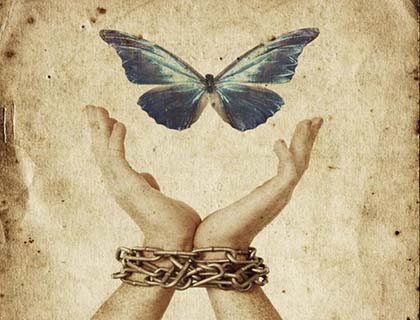Men have persevered historically to break the fetters and enjoy freedom in their social and political life. Jean-Jacques Rousseau has aptly said, “Man is born free and everywhere he is in chains.” Men strived to break the chains and invalidate the conservative traditions, dictatorial regimes and fundamental perspectives of religion which have narrowed the realm of their freedom. Before the age of modernity, men were subjugated to the will of kings, masters and lords of church. However, modernity nullified their nobleness and masteries over others.
John Locke believes that all people are born with the inherent rights to life, liberty, and estate. These rights are not unlimited, Locke said, and may only be appropriated according to the fair share earned by the labor of each person. According to him, the right to freedom is a birthright and inalienable as no one, including the government, can fetter or divest man of this right.
Rousseau is defining natural man as being free and happy and living in the forest. Rousseau explains how man went from this state of autonomy to the modern condition, dominated by inequality, dependency, violence and unhappiness. There were positive aspects to this process too, he admits, including the creation of families, the discovery of tools and technology, and the building of cities and social organizations. Unfortunately, this also gives way to what Rousseau called the “right of the strongest”, where a reign of inequality destroys man’s original state of happiness and freedom. Humanity becomes alienated, and the discourse on inequality ends unhappily in general war.
The Social Contract is an attempt to find a solution to this problem. For Rousseau, because of man’s “perfectibility”, the passage from a natural state to a social one is both an accident and necessary. Unlike animals, men are programmed to create and progress from one condition to the next. Rousseau discovers a way men can associate themselves with each other while maintaining their own individual freedom inside a social and political organization. He calls that concept the “general will”. Simply put, it is a form of association in which an individual alienates himself completely to the general will, and therefore regains his freedom in a political form. This of course has been criticized: some say it leads directly to dictatorship. Others say it is based on the premise that the people enter into a contract with nobody else but themselves – a logical impossibility.
However, Rousseau believed that in the form of the general will, the alienation of man would transform itself into freedom – this makes him nothing less than the inventor of modern dialectics, uniting the opposing concepts of nature and society, in their own opposition. All of Rousseau’s philosophy is an attempt to find a solution to the problem of alienation. For Rousseau, the only thing that made humans different from animals is his free will, something constantly placed in danger whenever man enters into society.
As a revolutionary thinker, Rousseau understood that the general will, or the will of the people, should be sovereign – and that is the catch. It is here where we regain our freedom inside social organization. Only the general will – general interest as opposed to private interest – guarantees man his autonomy. No society can be free unless individuals understand that the general will or general interest should prevail over their own individual one.
Rousseau also wrote of the emergence of machines and the rise of technology. He was the first to say that nature has limited resources and that we are putting our own survival in danger by over-exploiting it.
“Man is born free and everywhere is in chains.” Centuries after that prophetic opening sentence, we should ask ourselves if we can afford to ignore Rousseau’s warning, in a world dominated by flashing mobile phones and social media. Man may indeed be born free, but in the 21st century, the chains may be even harder to see.
Rousseau wrote that man was naturally good but becomes corrupted by the pernicious influence of human society and institutions. He preached a mankind improved by returning to nature and living a natural life at peace with his neighbors and himself. He claims to be in favor of democracy, but what he really favors is egalitarianism. Rousseau’s influence both in art and politics was huge in his own day and continues to be strong today.
Rousseau perseveres returning to nature and considers modernity a chain on the feet of man. He is right in a term that with the development of technology in modern world, the weapons of mass destruction emerged which threatens the life and liberty of the man every second. It is also believed that our forefathers felt more freedom intrinsically and the modern terms such as liberalism, secularism, etc. did not affect their simple and pure faith.
However, modernism, which was pregnant with liberalism, secularism, egalitarianism and many other isms, awakened the people and broke the chain of slavery and abrogated discrimination from the world. As a result, the Universal Declaration of Human Rights (UDHR) entitles man with inalienable and equal rights stating, “Whereas recognition of the inherent dignity and of the equal and inalienable rights of all members of the human family is the foundation of freedom, justice and peace in the world, whereas disregard and contempt for human rights have resulted in barbarous acts which have outraged the conscience of mankind, and the advent of a world in which human beings shall enjoy freedom of speech and belief and freedom from fear and want has been proclaimed as the highest aspiration of the common people ….”

